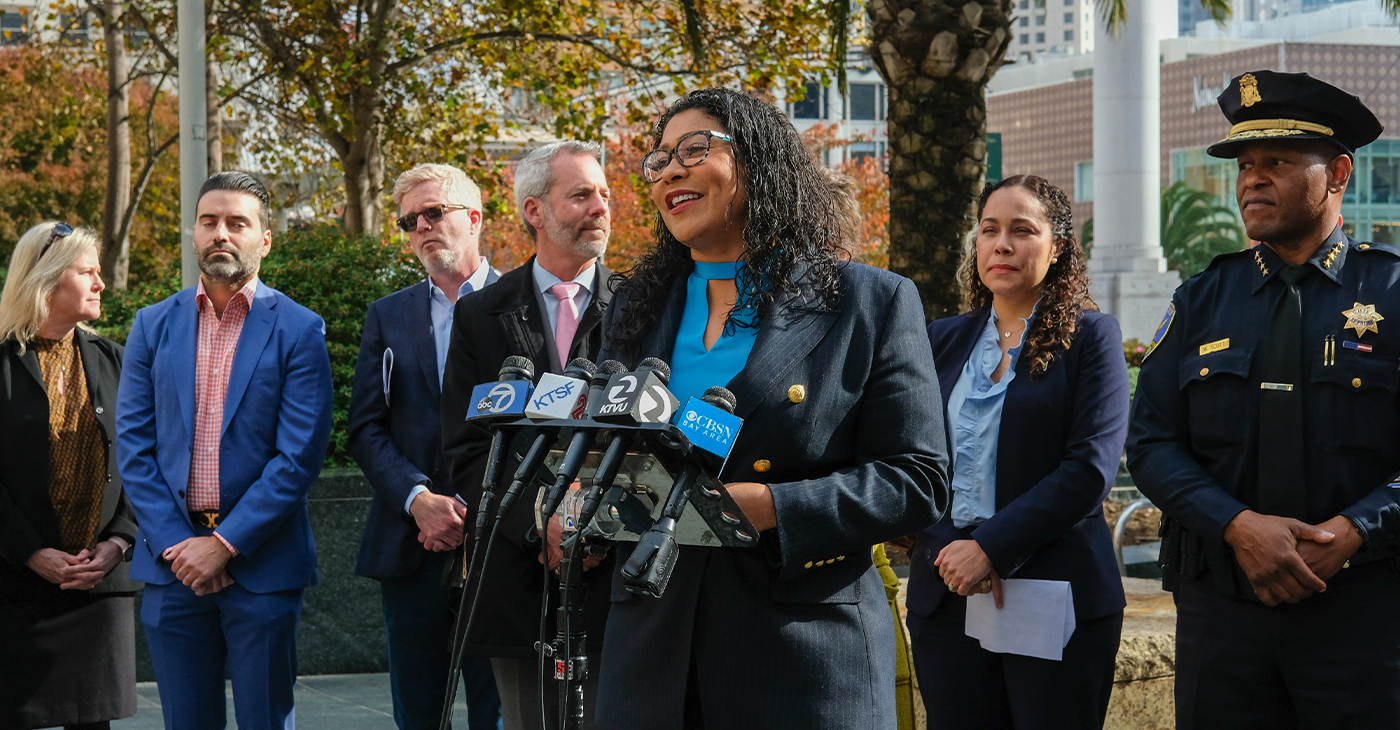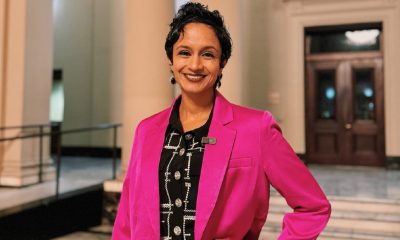Bay Area
Mayor Wants to Keep Street Ambassador Program, Add Retention Bonuses for Police to Keep Streets Safer
San Francisco Mayor London Breed told the Board of Supervisors on Tuesday that keeping street ambassador programs and adding supplemental funding for police and prosecutors will contribute to the city’s efforts to make its streets safer. Breed requested the policymakers to support a series of actions that intend to increase public safety

By Olivia Wynkoop
Bay City News
San Francisco Mayor London Breed told the Board of Supervisors on Tuesday that keeping street ambassador programs and adding supplemental funding for police and prosecutors will contribute to the city’s efforts to make its streets safer.
Breed requested the policymakers to support a series of actions that intend to increase public safety.
One is extending the current contract for street ambassador programs put on by Urban Alchemy and Mid-Market Ambassadors in the Tenderloin and Downtown neighborhoods. Set to be reviewed at Wednesday’s Budget and Appropriations Committee meeting, the programs work to welcome visitors and assist pedestrians.
Breed mentioned that many of the community ambassadors who are part of these programs are people of color who were formerly incarcerated or homeless.
“When we talk about alternatives to policing, they are a perfect representation of what we’re trying to do,” Breed said. “Not only do they serve as non-police presence on the street, but they also train and uplift people who deserve a second chance.”
Breed also asked the board to quickly advance a $26.7 million budget supplemental she proposed in February that would fund police overtime and hire more prosecutors in San Francisco’s District Attorney’s Office.
The supplemental would work as a quick fix to the city’s severe police staffing shortage, deploy retired police ambassadors for beat patrol presence and hire more attorneys that can tackle fentanyl drug dealing cases, she said.
The San Francisco Police Department cited that between 2021 and 2022, it saw an overtime increase of 121 percent in order to respond to basic needs and have a greater presence in Downtown.
“This is about public safety right now. I know we need long-term strategies to address our significant staffing shortage, and we are working on that,” said Breed. “But every day, I hear from residents — and I’m sure you all do too — and small businesses who want us to do more around public safety. I’m hoping that we don’t continue to delay.”
Breed also said she’s introducing a three-year contract with the police department to offer retention bonuses and recruitment incentives to keep seasoned officers and onboard new ones. The contract would make the police department have the highest paid starting salary in the region.
Breed said police staffing is a national crisis.
“It’s one we have to tackle aggressively with local solutions,” she said.
EDITORS PLEASE NOTE: Image(s) related to this story can be obtained from the following Bay City News Service web link(s):
https://www.baycitynews.com/images/20221122-BCN-UNIONSQUARE-8.jpg
San Francisco Mayor London Breed joins a flock of city and business leaders to launch a strategic plan to bring Union Square back to life on Nov. 22, 2022. (Olivia Wynkoop/ Bay City News)
/www/bcn/general/03/newsclip.23.03.07.23.38.01.1.txt
Activism
Asm. Corey Jackson Proposes Safe Parking for Homeless College Students Sleeping in Cars
Assemblymember Corey Jackson (D-Moreno Valley), a member of the California Legislative Black Caucus (CLBC), is the author of AB 90, which would require community colleges and California State University campuses to create overnight parking programs where students can sleep safely in their vehicles. With one in four community college students in California experiencing homelessness in the past year, Jackson says the state must act urgently.

By Bo Tefu
California Black Media
As California’s housing crisis continues to impact students, new legislation, Assembly Bill (AB) 90, promises to allow college students without stable housing to sleep in their cars on campus, offering a stark but practical solution aimed at immediate relief.
Assemblymember Corey Jackson (D-Moreno Valley), a member of the California Legislative Black Caucus (CLBC), is the author of AB 90, which would require community colleges and California State University campuses to create overnight parking programs where students can sleep safely in their vehicles. With one in four community college students in California experiencing homelessness in the past year, Jackson says the state must act urgently.
“This just deals with the harsh realities that we find ourselves in,” he said at a recent hearing.
The bill passed its first committee vote and is gaining attention as housing affordability remains a top concern across the state. California rents are more than 30% above the national average, and long waitlists for student housing have left thousands in limbo. CSU reported more than 4,000 students on its housing waitlist last year.
Supporters stress that the bill is not a long-term solution, but a humane step toward helping students who have no other place to go. A successful pilot program at Long Beach City College has already shown that safe, supervised overnight parking can work, giving students access to restrooms, Wi-Fi, and a secure environment.
However, the CSU and community college systems oppose the bill, citing funding concerns. Critics also worry about safety and oversight. But Jackson and student advocates argue the crisis demands bold action.
“If we know students are already sleeping in their cars, why not help them do it safely?” said Ivan Hernandez, president of the Student Senate for California Community Colleges.
Activism
Faces Around the Bay: Author Karen Lewis Took the ‘Detour to Straight Street’
“My life has been a roller-coaster with an unlimited ride wristband! I was raised in Berkeley during the time of Ron Dellums, the Black Panthers, and People’s Park. I was a Hippie kid, my Auntie cut off all our hair so we could wear the natural styles like her and Angela Davis.

By Barbara Fluhrer
I met Karen Lewis on a park bench in Berkeley. She wrote her story on the spot.
“My life has been a roller-coaster with an unlimited ride wristband! I was raised in Berkeley during the time of Ron Dellums, the Black Panthers, and People’s Park. I was a Hippie kid, my Auntie cut off all our hair so we could wear the natural styles like her and Angela Davis.
I got married young, then ended up getting divorced, raising two boys into men. After my divorce, I had a stroke that left me blind and paralyzed. I was homeless, lost in a fog with blurred vision.
Jesus healed me! I now have two beautiful grandkids. At 61, this age and this stage, I am finally free indeed. Our Lord Jesus Christ saved my soul. I now know how to be still. I lay at his feet. I surrender and just rest. My life and every step on my path have already been ordered. So, I have learned in this life…it’s nice to be nice. No stressing, just blessings. Pray for the best and deal with the rest.
Nobody is perfect, so forgive quickly and love easily!”
Lewis’ book “Detour to Straight Street” is available on Amazon.
Activism
Barbara Lee Accepts Victory With “Responsibility, Humility and Love”
“I accept your choice with a deep sense of responsibility, humility, and love. Oakland is a deeply divided City,” Lee said in an April 19 statement. “I answered the call to run to unite our community, so that I can represent every voter, and we can all work together as One Oakland to solve our most pressing problems.”

By Antonio Ray Harvey,
California Black Media
As a candidate for mayor, former U.S. Representative Barbara Lee released a “10-point plan” last week to reassure residents that she will tackle Oakland’s most pressing challenges.
Now that she has edged out her competitors in the ranked-choice special election with 50% or more of the vote, the former Congresswoman, who represented parts of the Bay Area in the U.S. House of Representatives, can put her vision in motion as the city’s first Black woman mayor.
“I accept your choice with a deep sense of responsibility, humility, and love. Oakland is a deeply divided City,” Lee said in an April 19 statement. “I answered the call to run to unite our community, so that I can represent every voter, and we can all work together as One Oakland to solve our most pressing problems.”
On Saturday evening, Taylor conceded to Lee. There are still about 300 Vote-by-Mail ballots left to be verified, according to county election officials. The ballots will be processed on April 21 and April 22.
“This morning, I called Congresswoman Barbara Lee to congratulate her on becoming the next Mayor of Oakland,” Taylor said in a statement.
“I pray that Mayor-Elect Lee fulfills her commitment to unify Oakland by authentically engaging the 47% of Oaklanders who voted for me and who want pragmatic, results-driven leadership.”
The influential Oakland Post endorsed Lee’s campaign, commending her leadership on the local, state, and federal levels.
Paul Cobb, The Post’s publisher, told California Black Media that Lee will bring back “respect and accountability” to the mayor’s office.
“She is going to be a collegial leader drawing on the advice of community nonprofit organizations and those who have experience in dealing with various issues,” Cobb said. “She’s going to try to do a consensus-building thing among those who know the present problems that face the city.”
Born in El Paso, Texas, Lee’s family moved to California while she was in high school. At 20 years old, Lee divorced her husband after the birth of her first child. After the split, Lee went through a tough period, becoming homeless and having to apply for public assistance to make ends meet.
But destitution did not deter the young woman.
Lee groomed herself to become an activist and advocate in Oakland and committed to standing up for the most vulnerable citizens in her community.
Lee traveled to Washington, D.C. to work for then U.S. Congressman Ron Dellums after receiving a Bachelor of Arts degree from Mills College in Oakland in 1973. Lee later won a U.S. Department of Housing and Urban Development (HUD) fellowship to attend the School of Social Welfare, and she earned a Master of Social Work from the University of California-Berkeley in 1975.
Lee later served in the California State Assembly and State Senate before she was elected to Congress in 1998.
After serving in the U.S. Congress for more than 25 years, Lee ran unsuccessfully for California’s U.S. Senate in the 2024 primary election.
Lee joins current Los Angeles mayor Karen Bass and former San Francisco Mayor London Breed as Black women serving as chief executives of major cities in California over the last few years.
-

 Activism4 weeks ago
Activism4 weeks agoOakland Post Endorses Barbara Lee
-

 Activism3 weeks ago
Activism3 weeks agoOakland Post: Week of April 2 – 8, 2025
-

 #NNPA BlackPress3 weeks ago
#NNPA BlackPress3 weeks agoTrump Profits, Black America Pays the Price
-

 Activism2 weeks ago
Activism2 weeks agoOakland Post: Week of April 9 – 15, 2025
-

 #NNPA BlackPress3 weeks ago
#NNPA BlackPress3 weeks agoHarriet Tubman Scrubbed; DEI Dismantled
-

 #NNPA BlackPress3 weeks ago
#NNPA BlackPress3 weeks agoTrump Targets a Slavery Removal from the National Museum of African-American History and Culture
-

 #NNPA BlackPress3 weeks ago
#NNPA BlackPress3 weeks agoLawmakers Greenlight Reparations Study for Descendants of Enslaved Marylanders
-

 #NNPA BlackPress3 weeks ago
#NNPA BlackPress3 weeks agoNew York Stands Firm Against Trump Administration’s Order to Abandon Diversity in Schools























































